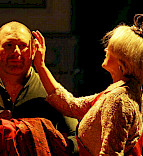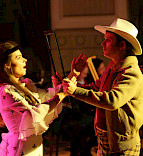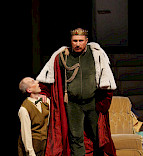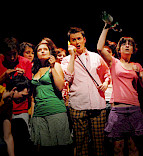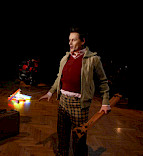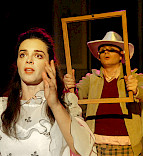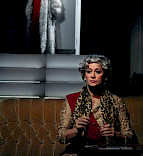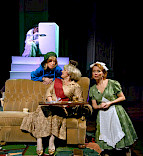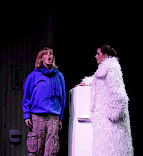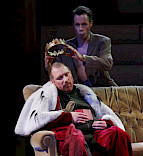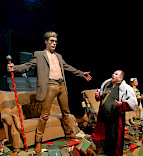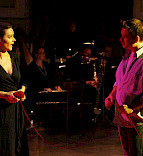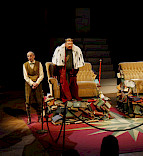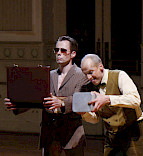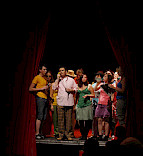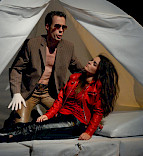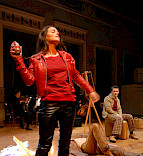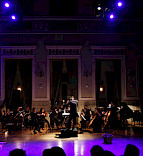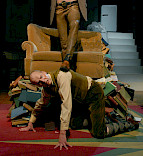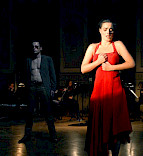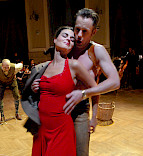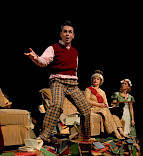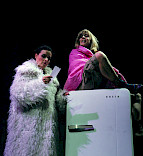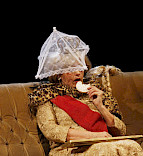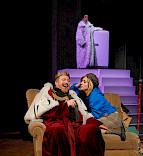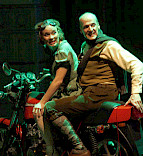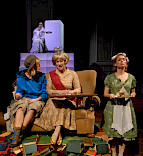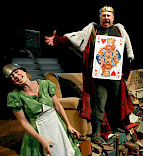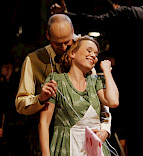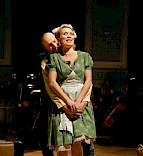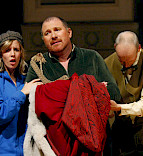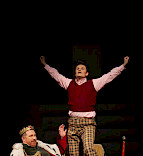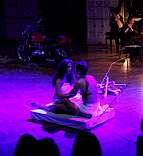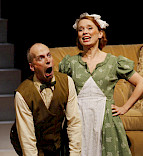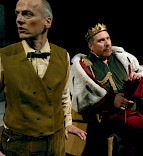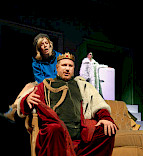Musical America, 06. November 2008, Larry L. Lash
A New-age Fairytale Flop
VIENNA -- Once upon a time, a group of extremely talented musicians and writers could find no outlet in Vienna in which to present their cutting-edge creations, so they founded sirene Operntheater in a salon. Today, ten years later, they perform at least one full-scale premiere production a year at the Otto Wagner-designed Jugendstiltheater overlooking Vienna from Baumgartner Höhe, occasionally co-producing works with larger, established companies such as Brigitte Fassbaender’s prestigious Tiroler Landestheater in Innsbruck.
The driving forces behind sirene’s development have been librettist and director Kristine Tornquist, and composer Jury Everhartz. Indeed, two of Everhartz’s works – “Das Krokodil” and “Circus” – have proven to be among the most successful new operas to be produced here in the past decade, and will surely have life beyond their premieres.
The latest from sirene is “Prinz, Held und Füchsin,” (“Prince, Hero and Vixen”), an “opera buffa in two acts” with music by Akos Banlaky and libretto by Tornquist that began a limited run Oct. 25.
With a running time of 160 minutes (not including intermission), it is longer than “Das Rheingold,” “Wozzeck,” or anything by Puccini. Somewhere in there is a good 90- to110-minute work, but at this length it sags under the weight of Tornquist’s endlessly talky, humorless, dramatically flaccid libretto.
A contemporary fairy tale, the opera concerns a lazy King (Rupert Bergmann), his distant, self-occupied Queen (Ingrid Habermann), their lackeys (Ulla Pilz and Johann Leutgeb), and their son, the Prince (Alexander Mayr). As any good Prince would, he wants his own princess, here a feisty young woman referred to as the Vixen (Nina Maria Plangg).
The Vixen has her own ideas about a life of adventure and independence and sets off for the “wild west,” which lands her somewhere in the neighborhood of Arizona. The prince follows her. Too shy to make love to her, he hires a Hero (Dieter Kschwendt-Michael) – in reality a gigolo – to do the seducing on his behalf. The plan backfires, and the Vixen departs for the “high north” to bear the Hero’s child, as the disenchanted Prince departs for Manila.
Mixed in with this over the course of the 100-minute first act (about as long as a complete “Salome” or “Elektra”) is the ongoing saga of the King and his Lackey, whose sole duty is to tend to the King’s stockings and slippers, and the Queen and her Serving Girl, whose sole duty is to tend to the Queen’s wigs and serve coffee. Of course, the servants have a thing for each other, while the King and Queen can exchange only the most insipid platitudes at their rare chance meetings.
Years later, the Vixen’s precocious son, Moritz (Romana Beutel), sets off in search of his true identity. Arriving at the royal court, he causes great commotion that ultimately results in a (mostly) happy ending: the King and Queen are reunited and start a new life and join the Lackey and Serving Girl for a hand of bridge, and the Prince returns from Manila and accepts Moritz as his own son and, with the Vixen, embarks on a journey to fulfill the boy’s ambition to make the world a better place. Only the Hero, who has assumed the throne, is disappointed to find that he is a powerless figurehead, a Pantoffelkönig (slipper king).
Banlaky’s often admirable tonal score is skillfully constructed, with passages redolent of Debussy and Hindemith, some engaging, ambitious, Straussian vocal lines, intriguing orchestrations including accordion and cembalo and a few bluesy, jazzy jokes. While there are some soaring, well-composed ensembles, Banlaky is too often mired by Tornquist’s prosaic text, no matter how well the thoroughly outstanding cast of New Music experts puts it across. Too often the work sinks into mere competence and even boredom, as the second act loses all momentum.
The ambitious production by Stephan Bruckmeier with sets and costumes by Andrea Költringer works hard to entertain and hold attention, as does the excellent ensemble sirene under Rossen Gergov’s direction.
sirene has offered numerous pleasures over the years, some of them unforgettable (such as the “orchestra” of 12 grand pianos for “Das Krokodil”), and I have always taken something away from its productions. With “Prinz, Held und Füchsin”, what I kept looking for – in studying the libretto beforehand, listening to the performance, and rereading the libretto afterwards – was some meaning, some moral to the story, some justification for the work’s existence.
Sadly, I came up empty.

